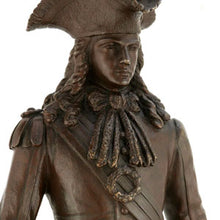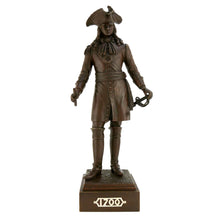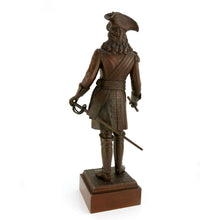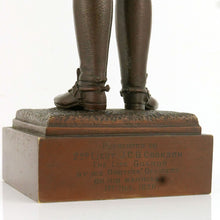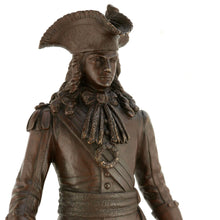The Life Guards - George V Regimental Presentation Figure, 1926
- Regular price
- £3,800
- Sale price
- £3,800
- Regular price
-
- Unit price
- /per
Adding product to your cart
35.5cm (13.5in) x 8.5cm (3in) x 8.5cm (3in)
Provenance: Meldon Park, Northumberland.
Patinated bronze. Modelled as John Churchill, 1st Duke of Marlborough (1650-1722) at the time of the War of The Spanish Succession (1701-14), raised on an integral square plinth, inscribed ‘Presented to 2nd Lieut J.C.B. Cookson, The Life Guards, by his brother officers on his marriage on 1st December 1926’.
The 1st Duke of Marlborough’s connection with the Life Guards comes from his promotion to Major-General and appointment to the Colonelcy of the 3rd Troop of Life Guards in recognition of his contribution to the suppression of the Duke of Monmouth's Rebellion of 1685. The regiment was later designated the Duke of Marlborough's Troop of Horse Guards between 1740 and 1742. Originally raised in 1659 as Monck's Troop of Horse Guards, the regiment became the 2nd Troop of Horse Guards in 1751 and from 1788 the 2nd Regiment of Life Guards. The 2nd Life Guards were amalgamated with the 1st Life Guards in 1922.
Read more
Colonel John Charles Blencowe Cookson, DSO, (1904-1987), was the son of Colonel P.B. Cookson, of Meldon Park, Morpeth, Northumberland. He was commissioned into the Life Guards in the 1920s, and served during the Second World War with 102nd (Northumberland Hussars) Anti-Tank Regiment. During the attempt by British, Indian and Commonwealth forces to relieve Tobruk in November 1941 (Operation Crusader), Cookson played a courageous role in repulsing enemy tanks that were endeavouring to break through the rear of 7th Armoured Division, after Rommel ordered his ‘dash to the wire’. For his initiative, leadership and the destruction of five German tanks Cookson was awarded an immediate DSO. He was afterwards Lieutenant-Colonel, 81st Anti-Tank Regiment, RA, 1942-44, and Honorary Colonel Northumberland Hussars, 1964-1970.
The sculptor Charles Curry (fl. 1910-30) carried out work for the prestigious London silversmith and Royal Warrant holder Carrington & Co. The firm produced Curry’s model of the Duke of Marlborough in silver as well as bronze. The firm’s principal John Carrington was a Prime Warden of the Goldsmiths’ Company.






